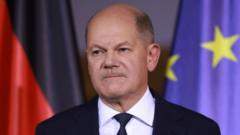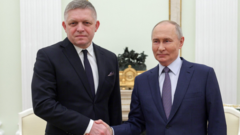In a surprise turn of events, Chancellor Olaf Scholz has plunged Germany into political turmoil following the dismissal of Finance Minister Christian Lindner, sparking a significant upheaval within the ruling coalition. The decision, made by Scholz, has led to the resignation of additional cabinet members from Lindner's party, effectively fracturing the three-party coalition that has governed Germany. As Scholz now finds himself leading a minority government, the path to navigate pressing legislative agendas becomes fraught with challenges. Without a parliamentary majority, the chancellor needs to garner support from opposition parties to pass crucial policies, including the impending budget for 2025.
Political Turmoil in Germany: Scholz Coalition Faces Collapse

Political Turmoil in Germany: Scholz Coalition Faces Collapse
Germany's political landscape teeters on the brink of a crisis following the dismantling of Chancellor Olaf Scholz's coalition government.
With the ongoing economic slowdown and a looming potential shift in U.S. foreign policy, the stakes are high for both Germany and Europe. Scholz has reached out to opposition leader Friedrich Merz for collaboration on vital issues, such as support for Ukraine, amidst fears of a decline in international backing as political dynamics evolve. The political landscape has shifted drastically as tensions between Scholz's Social Democrats and Lindner’s Free Democrats rooted in divergent economic strategies come to the surface. The friction, coupled with upcoming elections and calls for immediate voting, creates an uncertain future for German governance. As the nation grapples with an internal crisis, the balance of power and stability in European leadership hangs in the balance.
The coalition's collapse has highlighted deep-seated ideological divisions regarding economic recovery strategies, as Scholz advocates for increased public investment, while Lindner's camp pushes for conservative fiscal policies. Polls indicate a growing frustration among voters toward government infighting, further complicating matters for all involved. As political leaders brace for an unpredictable landscape, the urgency for a cohesive governing body resonates strongly within Germany and beyond, especially as global political dynamics continue to unfold amid the impending U.S. election and shifting international alliances.
The coalition's collapse has highlighted deep-seated ideological divisions regarding economic recovery strategies, as Scholz advocates for increased public investment, while Lindner's camp pushes for conservative fiscal policies. Polls indicate a growing frustration among voters toward government infighting, further complicating matters for all involved. As political leaders brace for an unpredictable landscape, the urgency for a cohesive governing body resonates strongly within Germany and beyond, especially as global political dynamics continue to unfold amid the impending U.S. election and shifting international alliances.




















